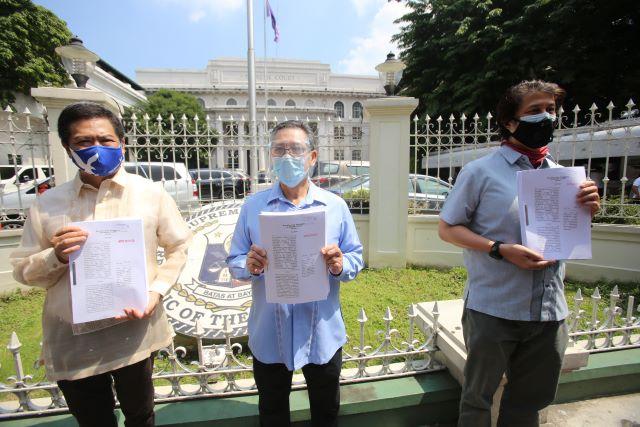Opposition lawmakers, framers of Constitution join fight vs. anti-terror law

More opposition lawmakers, two more members of the 1986 Constitutional Commission, and journalists have asked the Supreme Court to nullify the Anti-Terrorism Act of 2020 (ATA).
In a petition filed Thursday, Senators Francis Pangilinan and Leila de Lima and 18 others also asked the highest Philippine court to issue a temporary restraining order against the controversial law while the case is pending.
They also asked that the case be set for oral arguments.
This is the 12th petition filed against the new law, which was enacted amid criticism that it endangers constitutionally guaranteed rights. The SC has ordered the consolidation of the first eight petitions.
Florangel Rosario-Braid and Edmundo Garcia, both members of the commission that drafted the 1987 Constitution, also signed the petition. Two other framers, Christian Monsod and Felicitas Arroyo, joined another petition filed last July 8.
Quezon City 6th District Rep. Kit Belmonte, former senators Sergio Osmeña III and Wigberto Tañada Sr., former Deputy Speaker Erin Tañada, former Commission on Human Rights chair Etta Rosales, human rights lawyer Chel Diokno, Rappler CEO Maria Ressa and other Rappler editors are also among the petitioners.
They are represented by the Free Legal Assistance Group.
Among those who earlier filed similar petitions were retired Supreme Court (SC) justice Antonio Carpio, former Ombudsman Conchita Carpio-Morales, and UP law professors; labor groups; and civil society groups.
The petitions were filed despite assurances from the government that the law has enough safeguards against possible abuses.
"For posing a clear and imminent danger to free speech, the ATA must be struck down," the latest petition read, citing the law's provision on the crime of inciting to terrorism.
The petitioners also said the definition of terrorism in the law is both vague and overbroad, an argument that has consistently appeared in all the petitions challenging the law.
While the law exempts "advocacy, protest, dissent, stoppage of work, industrial or mass action, and other similar exercises of civil and political rights" from the definition of terrorism, the petitioners pointed out that such acts may be punished when "intended to cause death or serious physical harm to a person, to endanger a person's life, or to create a serious risk to public safety."
"What is at stake in this case affects every Filipino citizen because it involves the individual right of every person to speak freely on matters of public concern, and the collective right of the people peaceably to assemble and petition the government for redress of grievances," they said.
The petitioners also pointed out that the law authorizes the Anti-Terrorism Council, a body composed of executive officials, to authorize the detention of persons arrested without a warrant for up to 24 days without filing charges in court.
They said Section 29 does not contain the safeguard that was found in the Human Security Act, the law it replaced, where warrantless arrests were "legally possible" only if they resulted from court-ordered surveillance and examination of the suspects' bank deposits.
The Human Security Act also allowed warrantless detention for a maximum of three days, they said. In the Constitution, even when there is an actual invasion or rebellion and the president suspends the privilege of the writ of habeas corpus, a person can only be detained for up to three days before they have to be charged in court.
"Section 29 transgresses all these constitutional limitations," the petitioners said. They further claimed that Section 29 usurps the SC's rule-making power and violates the principle of civilian supremacy by "unlawfully" mobilizing the military for law enforcement.
The petitioners also questioned the "unbridled discretion" given to the Anti-Terrorism Council to "designate" persons or groups as terrorists and to the Anti-Money Laundering Council to freeze a designated person or group's assets without a court order.
"It should now be clear that the enforcement provisions of the ATA, which are constitutionally infirm in themselves, furnish the means that allow the law to be implemented in a manner that sweep unnecessarily broadly against protected freedoms, thereby creating a terrifying chilling effect that permeates and taints the entire law," they said. —KBK, GMA News




